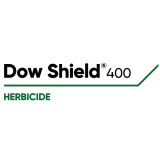Dow Shield® 400 an essential herbicide for speciality crops
 Specialist crop growers have been unfortunate in the last few years as they are denied active ingredients, either as products are revoked or as they go through re-registration and lose crops and uses. But the classic post-emergence herbicide Dow Shield® (clopyralid) has an extraordinary list of label crops and of Extension of Authorisation for Minor Uses (EAMUS) it has been on the market for over 40 years and continues to be an important herbicide for specialist growers.
Specialist crop growers have been unfortunate in the last few years as they are denied active ingredients, either as products are revoked or as they go through re-registration and lose crops and uses. But the classic post-emergence herbicide Dow Shield® (clopyralid) has an extraordinary list of label crops and of Extension of Authorisation for Minor Uses (EAMUS) it has been on the market for over 40 years and continues to be an important herbicide for specialist growers.
Being registered for over 4 decades, significant investment has been made to support its many uses in many crops to make it fit for purpose in today’s challenging regulatory driven markets, including six years ago the launch of a new and improved double strength formulation, Dow Shield 400. Throughout this time Dow Shield 400 has developed a reputation to become an important product for the control of difficult perennial and annual weeds such as creeping thistles, volunteer potatoes, spear thistle, corn marigold, groundsel, mayweeds and smooth sow-thistle in a wide range of crops.
Currently Dow Shield 400 has 19 different crops on its label, including swedes, turnips, mangels, bulb onions, broccoli/calabrese, cabbage, cauliflower, fodder beet, red beet, sugar beet, forage maize, linseed, grassland, ornamental plant production and Brussels sprouts as well as most cereals (wheat, barley, oats) and oilseed rape.
Dow Shield 400 has recommendations for most allium crops including bulb onions, salad onions, outdoor leeks, garlic and shallots. It can be used from 1st March and when these crops have at least 2 true leaves but before 6 weeks prior to harvest.
Cabbage, cauliflowers and broccoli can also be treated from the 2 true leaf stage or when well established if transplanted up to 6 weeks before harvest and Brussels sprouts between the 2 true leaf stage up to 9 true leaves. Dow Shield has a dose rate of 0.25L/ha for annual weeds, 0.5 L/ha for perennials in a single application or up to 0.75L/ha total maximum dose from two applications in a programmed approach.
Peas or beans should not be planted in the same year as the treatment with Dow Shield 400.
As for any EAMU, growers should obtain a copy of the notice of approval via the Chemicals Regulation Division (CRD) web site, ADAS offices or NFU.
You can read this update from Corteva on TFF's AGVendor...

Being registered for over 4 decades, significant investment has been made to support its many uses in many crops to make it fit for purpose in today’s challenging regulatory driven markets, including six years ago the launch of a new and improved double strength formulation, Dow Shield 400. Throughout this time Dow Shield 400 has developed a reputation to become an important product for the control of difficult perennial and annual weeds such as creeping thistles, volunteer potatoes, spear thistle, corn marigold, groundsel, mayweeds and smooth sow-thistle in a wide range of crops.
Currently Dow Shield 400 has 19 different crops on its label, including swedes, turnips, mangels, bulb onions, broccoli/calabrese, cabbage, cauliflower, fodder beet, red beet, sugar beet, forage maize, linseed, grassland, ornamental plant production and Brussels sprouts as well as most cereals (wheat, barley, oats) and oilseed rape.
Dow Shield 400 has recommendations for most allium crops including bulb onions, salad onions, outdoor leeks, garlic and shallots. It can be used from 1st March and when these crops have at least 2 true leaves but before 6 weeks prior to harvest.
Cabbage, cauliflowers and broccoli can also be treated from the 2 true leaf stage or when well established if transplanted up to 6 weeks before harvest and Brussels sprouts between the 2 true leaf stage up to 9 true leaves. Dow Shield has a dose rate of 0.25L/ha for annual weeds, 0.5 L/ha for perennials in a single application or up to 0.75L/ha total maximum dose from two applications in a programmed approach.
Peas or beans should not be planted in the same year as the treatment with Dow Shield 400.
As for any EAMU, growers should obtain a copy of the notice of approval via the Chemicals Regulation Division (CRD) web site, ADAS offices or NFU.
You can read this update from Corteva on TFF's AGVendor...





